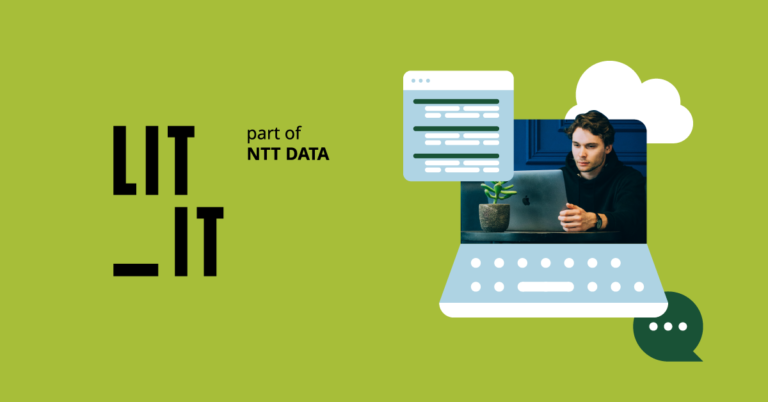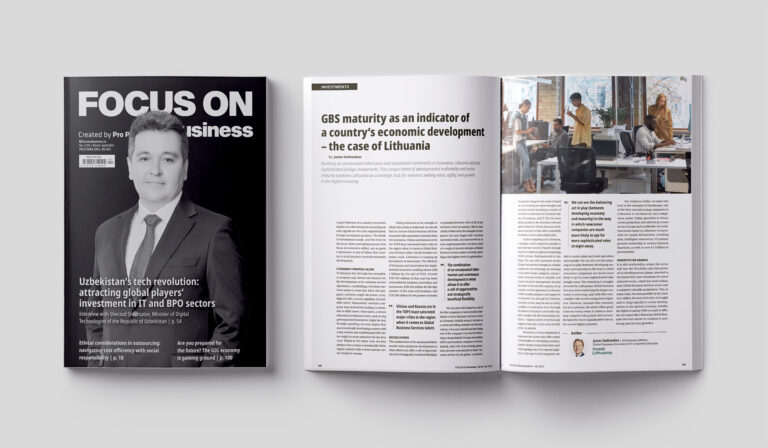This article by Monika Vilkelytė, Investment Advisor at Invest Lithuania, was first published in Outsourcing&More magazine. Please follow this link to read the whole issue.
The last decade has seen an explosion in the number of collaborative relationships between business and universities. It’s easy to see why: at a time when commercial R&D budgets are under increasing pressure, such partnerships enable companies to spend more wisely – and giving them access to cutting-edge research talent. For universities, there’s the draw of financial support and partnership.
But the benefits of cooperation are about more than simply cost savings. Stronger ties between industry and academia enable both sides to achieve things that were previously impossible, delivering innovation in fields from life sciences and biomedical engineering to communications, environmental sciences, artificial intelligence, and more.
And when it comes to cooperation, one European nation is conspicuously ahead of the curve: Lithuania, home to a fast-growing global business services sector, and a centre of innovation in fintech. We take a look at the key trends shaping the market and examine the secrets of the Baltic state’s success.
Long-term relationships
Instead of one-off, ad hoc projects, businesses from many sectors are forging long-term, collaborative relationships with universities and other academic institutions. These educational and research bodies, for their part, benefit from long-term funding stability and closer ties with the business community that provide valuable market insights, skills and technical expertise.
Examples can be found in the relationships that US technology company Cognizant is building with Lithuanian universities. The country is at the forefront of a truly international market in business services, and companies investing in Lithuania are no longer simply looking for English-speaking talent. Cognizant’s operations in the country focus on the Nordic market, and company consequently needs qualified specialists with good Scandinavian language skills. Rather than simply investing in on-the-job training, Cognizant has built longer-term links with universities to supply the skills it needs. Besides helping future professionals expand their language portfolio, it now also offers students from the ISM University of Management and Economics the possibility to gain first-hand business consulting experience.
US healthcare giant Intermedix is another major international player building long-term relationships with Lithuanian universities. In 2015, the company invested more than 100,000 EUR into a specialist laboratory at the Kaunas Technology University (KTU) Faculty of Informatics, providing hardware and software for processing Big Data.
The Creativity Lab partnership is just one part of an evolving, long-term relationship between the two: since Intermedix established its first European service centre in Lithuania in 2014, many of its staff have been either current students or graduates of KTU. As former KTU Rector Petras Baršauskas put it at the time: “Science and business need to work closely together to achieve mutually beneficial goals. The new laboratory offers researchers and students the opportunity to develop and realise their ideas, and gives business the chance to work with the most talented future employees, and to participate in the process of developing new technologies and innovations.”
Cooperative, not transactional
Alongside this longer-term perspective comes another trend: relationships are becoming truly cooperative and collaborative. Neither side in the arrangement wants a transactional model, in which negotiations must take place every time a new research project is being considered. Instead, they are turning to a relationship model.
This new, durable, cooperative model enables businesses to partner with academia in such a way that they remain continuously connected to early-stage research, and are able to accelerate the translation of that research into new products, driving economic growth.
Since 2014, international industrial control and automation company Festo has provided scholarships and work placements to KTU students, as well as providing lectures on current issues in information technology.
It‘s a relationship that clearly demonstrates the advantages of collaborative working – and it’s already bearing fruit, delivering innovative research with clear market potential. In 2017, KTU programming student Aivaras Čiurlionis received a scholarship from Festo for work on an applet for teaching mathematics that exploited the potential of neural networks.
Two-way process
Instead of simply monitoring early-stage research at universities, ready to pounce when something of interest emerges, smarter companies are becoming involved throughout the research chain – enabling them to ‘seed’ research into potential areas of benefit.
Software giant SAP currently works with Vilnius Gediminas Technical University (VGTU), and provides lists of topics for potential research projects that run the gamut from AI and Big Data to Unmanned Aerial Vehicles.
By co-funding research and providing input into course design, businesses can become part of a positive feedback loop that produces results in the real world – while universities and students gain valuable insights into technology trends and the process of commercialisation.
Closer to the action
One feature of recent trends in collaboration has been the willingness of companies to locate themselves in industry clusters close to where the academic talent lies. The benefits of this has long been known: California’s Silicon Valley, for example, is its close proximity to Stanford and University of California, Berkeley. But the last decade has seen the phenomenon widen, with big players such as Google, Amazon and Oracle opening offices on America’s east-coast, close to the USA’s commercial and financial centres.
Lithuania’s twin innovation hubs of Vilnius and Kaunas, with expertise in a range of areas from global business services to banking and fintech, make them a go-to destination for international players in search of the expertise necessary to build growth in Europe and beyond.
Adding value
The new, deeper, more durable brand of cooperation is also seeking to do more than simply provide universities with funding, and businesses with talent. By working together, creating new enterprises, these partnerships between business and academia can achieve results that neither party could achieve alone.
Companies are now recognizing that in order to attract the brightest and best talent, they must create purpose-driven partnerships that align with values such as meaningful work and social utility. Likewise, universities see their role extending beyond simply teaching and research, and are becoming valuable contributors to social mobility and economic growth. The most effective of these new partnerships help to energize the wider economy and society.
One such initiative, between Vilnius University (VU) and international finance giant Barclays, aims to tackle the scourge of the modern digital economy – cyber-crime.
Cooperation between the two began as far back as 2009, when the bank established a strategic centre for technologies and services as part of the Lithuanian capital’s burgeoning international banking and fintech hub. Since then, the company has worked with VU’s Faculty of Mathematics and Informatics to develop courses, and Barclays staff are involved in lectures and teaching initiatives, helping to provide VU students with real-world insights into online threats. In 2013, Barclays and VU opened the mobile application development lab “Innovation Space”.
“You are like a hidden jewel of Europe,” said Barclays’ Head of Operations and Technology, Michael Harte, on a visit to review cooperation in 2015. “Perhaps as small as a state, but you have the potential to do really good research and contribute to common European prosperity.”















